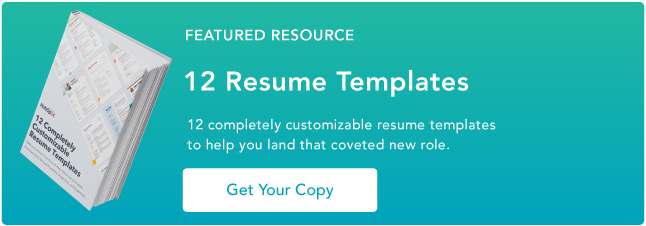
Making the Most of Electronic Resumes (Pro Tips and Tricks)
- November 25, 2023
- Knowledge Base
- 0 Comments

I’ve submitted hundreds of electronic resumes throughout my career. These digital job applications hold so much weight in the job search process. It’s always nerve-wracking to make sure I’m doing everything right.

I always ask myself: Does this meet the submission requirements? Did I use the right font? Will my resume surpass the employer’s applicant tracking system (ATS)?
If you’ve also wanted to ensure you have the highest chance of standing out and securing an interview, here’s how to make the most of electronic resumes.
Table of Contents
What is an electronic resume?
An electronic resume is any resume that’s submitted online. Employers will request electronic resumes in plain text (ASCII), HTML, or PDF.
This helps applicant tracking systems (ATSs) easily scan and decipher the hundreds of resumes they receive. To meet these standards, electronic resumes are typically created with limited design or formatting.
The Benefits of Electronic Resumes
In my experience, electronic resumes helped me refine my approach to better position myself for a job. I found that I was more likely to land an interview when
I tailored my resume to the job posting, used simple fonts, and included keywords.
Here are a few benefits of using electronic resumes.
You’ll match the ATS.
Only 30% of resumes are accepted by applicant tracking systems (ATS). But when they’re done right, ATS-approved resumes yield successful results.
When I spoke to Rodolphe Dutel, the founder of remote job board Remotive, about his experience with electronic resumes, he shared with me an incredible story.
Early in his career, he was part of a batch of new hires at Google. Dutel later learned that his electronic resume was the sole reason he landed the role.
“It just so happened that I was one of two people that were not peer-recommended,” he recalls, “meaning that my resume actually got picked up by the ATS, and they decided to contact me.”
Dutel went on to work at Buffer, where he helped grow the team from 20 to 80 people as the director of operations before founding Remotive.
If you want to match a company’s ATS and ensure your resume gets scanned, use your electronic resume to make sure you’re presenting the right information for the job.
You can focus on content.
One of the very first resumes I created was, admittedly, over the top.
I used a chunky, bright-colored font for my name, followed by weirdly formatted experience and skills sections separated by vertical and horizontal lines.
I would show you what it looked like, but I’m pretty sure I deleted it out of sheer embarrassment.
I did all of this to hide the fact that I didn’t have much work experience yet.
Looking back, it probably would’ve been better to keep it simple and focus on writing a resume that showcased my strengths. Instead, I tried to hide my lack of experience.
This is where a simple electronic resume would help. When you’re required to submit a plain text, no-frills version of your resume, you’re forced to focus on the actual skills. Write about the results you’ve achieved and can bring to a new role.
Demonstrates your ability to follow instructions.
If a job application asks you to submit a plain text version of your resume, you can guarantee that Microsoft Word Doc resumes will immediately be discarded.
Employers look for applicants who can demonstrate their ability to pay attention to details and follow instructions.
Your resume is the first impression you make on an employer. Use your electronic submission to stand out and start your interview process off on a positive note.
How to Make an Electronic Resume
To demonstrate how to make an electronic resume, I’m going to create one for myself for a specific job posting.
Here’s a job listing for a content writer at Orchard that aligns with my skills and experience:
Here’s how I would put together my electronic resume if I wanted to apply for this position.
1. Start with your contact information.
Your resume should start with the basics. Include your name, location (you can list this as “remote” if you’re seeking remote-only positions), and your email. You can also include your phone number.
Remember, the key to creating an electronic resume is to limit the formatting and design elements. Here’s how I’d format my contact information on my electronic resume (this isn’t my real contact information, of course):
Sam Lauron
Austin, TX, sam@email.com, (111) 222-3333
2. Mention your education.
If applicable, mention your education. This section typically includes the name of the school you went to, the type of degree you obtained, and any additional achievements you accomplished while in school.
Here’s how my education section would look for an electronic resume:
B.A. Mass Communication, Public Relations
Texas State University
3. Identify your target keywords.
To catch the attention of the ATS, it’s essential to use keywords that were mentioned in the job posting you’re applying to.
These keywords are what the ATS will scan for, so if your resume doesn’t mention any of the words from the job listing, it will automatically be discarded.
For example, if we take a look at the job listing for the content writer at Orchard, we can see keywords like “real estate,” “SEO best practices,” and “content strategy.”
Using that information, these are the keywords I’d target for the specific job posting at Orchard. Aim to incorporate these keywords throughout your resume.
Notice that I capitalized the beginning of each new keyword. This helps the ATS identify them as separate phrases.
Keywords: Content writer, Content strategy, SEO marketing, SEO best practices, Content marketing, Real estate
3. Highlight your skills.
With any resume you put together, it’s important to tailor it to the job you’re applying for. This includes adjusting your skills section to match the job listing if you want to increase your chances of the ATS picking up your resume.
Here’s an overview of what types of skills the role at Orchard is looking for:
Similar to the keywords, I can take language from this posting to generate skills I want to highlight.
Keep in mind that bullet points don’t often translate well in plain text. Instead, you can use a dash or asterisk. These are the skills I’d highlight on my electronic resume for this job.
Skills:
– Content writing
– Search engine optimization (SEO)
– Real estate industry knowledge
– Homeownership
– Writing explainer content
– Updating and optimizing content
4. Describe your work experience.
Now, time for the work experience section. You’ll do the same thing for this section as you’ve done for the last few. Use language and keywords from the job posting to describe your own experience.
Here’s the job description for the content writer role at Orchard:
Here’s how I would translate my work experience to match the job listing. Like the skills section above, I used dashes instead of bullet points.
Work Experience:
– Write educational explainer content
– Update and optimize older articles to ensure accuracy, and improve quality and overall search rankings
– Conduct research for data-based articles
– Execute SEO best practices
Electronic Resume Tips
Based on my experience of creating an electronic resume, here are some of my tips for making the most of the digital format. I also asked Dutel for his suggested best practices.
Use keywords.
Including keywords that were mentioned in the job posting is essential.
These words and phrases are what the ATS will scan for, so if your resume doesn’t mention any of the words the system is looking for, it will be automatically discarded.
“For instance, if you’re applying to be a business analyst and the job description wants someone who is proficient with data, it is your job to understand that you’re going to have to include keywords such as VBA, Excel, and Gantt chart,” says Dutel.
While incorporating the right words and phrases is important, they have to make sense.
“Remember that an ATS is looking for keywords whereas humans are looking for [experiences] that make sense,” says Dutel.
“If you don’t have the ability to fit in the keywords in your work experience section, you can add a section at the bottom of your electronic resume for other skills and add the keywords that you think are interesting.”
Keep context in mind.
You don’t want to stuff your digital resume with keywords, as this will be obvious and unenjoyable for a recruiter to read.
Instead, your resume should be a balance of careful targeting and original content to appease both the robots and the humans who will be reviewing your resume.
“Your resume should reflect who you are as a professional and individual,” suggests Dutel. “You have to articulate your work accomplishments and your learnings in such a way that’s understandable and friendly to an ATS and understandable and friendly to HR.”
Remove formatting.
In my experience, the simpler the resume, the better.
Some applications require you to paste your resume into the application, and a resume that’s overly designed doesn’t translate the same way when it’s submitted electronically. Unless you save it as a PDF, your format won’t remain intact.
Use simple fonts for your electronic resume. Acceptable fonts to use include Times New Roman, Arial, or any other type of web-safe font. The reason for this is that some fonts are hard to read while others simply don’t transfer if you submit your resume as a Microsoft doc, for instance.
You should also remove vertical lines, bullet points, and bold and italicized fonts as these can all mess up your resume when it’s scanned by the ATS and decrease your chances of getting through to the next stage.
Follow a standard structure.
While you want to include keywords that match the job description, it’s also important to follow a standard structure that will be understood by both ATS and HR.
Dutel recommends following the STAR method to structure your electronic resume. The STAR method is an interview technique that helps you answer a question in four parts. The acronym stands for Situation, Task, Action, and Result.
You can follow the same method when putting together your resume content.
Take a look at the job description and identify the skills you want to incorporate into your resume. Then, list those talking points in a similar way that you’d answer an interview question. Structuring your key points this way makes it easy for both robots and humans to follow along.
Another element of your electronic resume structure that should be standardized is the headings. Use standard headings like “work experience” or “skills” rather than trying to get creative.
The ATS is trained to pick up common phrases, so using less common words like “skillset” or “expertise” can impact whether or not your resume gets noticed.
Use a resume builder.
Staring at a blank page is intimidating. Instead of creating your electronic resume from scratch, use a resume builder or template to get started.
There are plenty of free resume builders available to job seekers. Some offer customizable templates, while others offer expert tips throughout the creation process.
Personally, my experience using HubSpot’s resume templates was seamless and fast. The template I used made it easy to stick to the common structure and acceptable format for electronic resumes while still being able to customize it to match my needs.
There are so many elements of the job searching and interviewing process that require a lot of time and preparation, but your electronic resume doesn’t have to be one of them.
By following these expert best practices, keeping your resume simple, and using professional resume templates, your electronic resume can be created and accepted in no time.
Getting Started
Electronic resumes don’t need to be daunting. This of them as a place where your work and skills can shine. Follow the steps above, and you’ll get noticed by both resume crawlers and humans.
![→ Download Now: 12 Resume Templates [Free Download]](https://no-cache.hubspot.com/cta/default/53/4ec95757-585e-40cf-9189-6b3885074e98.png)




